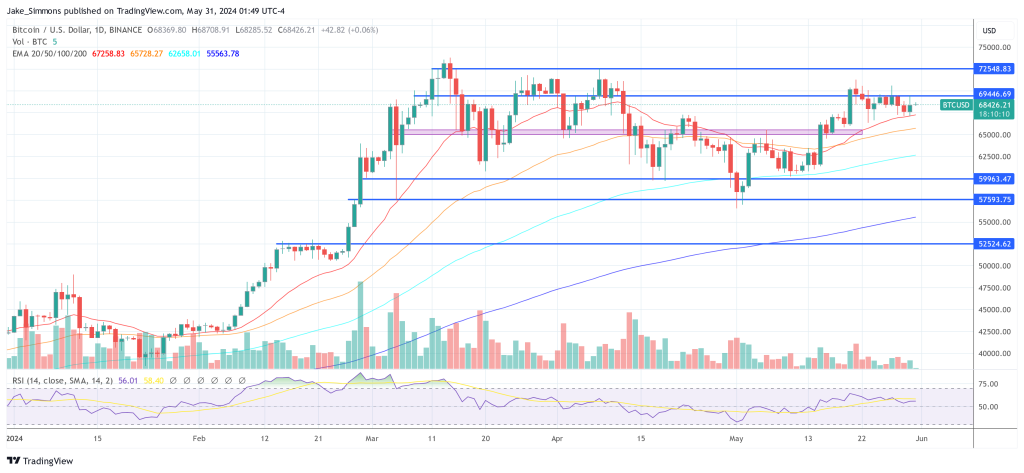Scott Johnsson, a finance lawyer at Van Buren Capital, has provided an extensive critique via X, detailing a series of stringent regulatory actions and policies (aka Operation Chokepoint 2.0) by the Biden administration towards the crypto sector. His observations suggest that despite some superficially positive gestures like the spot Ethereum ETF approval, the administration’s fundamental stance remains deeply antagonistic towards Bitcoin and crypto.
Persistent Regulatory Actions Against Crypto
Johnsson begins by addressing the refusal by the Office of the Comptroller of the Currency (OCC) to enact the “fair access” banking rule. This rule, advocated by former Comptroller Brian Brooks, aimed to ensure that federally chartered banks could not deny financial services based on political or ideological reasons. The administration’s rejection of this rule exemplifies a broader reluctance to dismantle regulatory barriers that discriminate against crypto businesses.
This stance is further evidenced by numerous aggressive enforcement actions against major exchanges, including Coinbase, Binance, and Kraken. All face enforcement based on what Johnsson calls an “unimaginably expansive definition of security.” These actions have unfolded without clear guidance from regulators, creating a climate of uncertainty and fear among crypto businesses regarding potential legal actions and the broad application of securities law.
The Securities and Exchange Commission (SEC) has been particularly active, issuing Wells Notices to several significant players within the industry. This includes Consensys, Uniswap Labs, and Paxos—the latter being forced to wind down the issuance of the BUSD stablecoin. Each of these actions illustrates the SEC’s readiness to leverage securities law in an unusually broad manner against crypto entities, potentially stifling innovation.
Moreover, Johnsson points out the SEC’s extension of the “dealer rule” to encompass DeFi platforms, requiring them to register as exchanges and comply with Regulation ATS. This move questions the decentralized nature of these platforms and casts doubt on their ability to operate under the current regulatory framework without substantial modifications.
Legislative Maneuvers And IRS Overreach
A critical move by the Treasury involved the insertion of “broker” definitions into crucial legislation under the cover of night, with subsequent IRS rules expanding these definitions to potentially encompass individuals and entities well beyond traditional brokers. This could have severe implications for DeFi platforms, essentially constraining their operations in the US.
Johnsson also sheds light on the Department of Justice’s (DOJ) departure from established FinCEN guidance in its actions against Tornado Cash and Samourai Wallet, applying money transmission charges that threaten severe legal consequences. These decisions mark a significant shift in how privacy-focused tools are treated under US law, signaling a potentially hostile environment for blockchain privacy innovations.
Banking And Institutional Barriers
The analysis continues with the Federal Deposit Insurance Corporation (FDIC) verbally messaging banks to maintain crypto deposit thresholds at 15 percent and requiring banks to seek individual approval for new crypto business engagements. Similarly, the Federal Reserve’s denial of Custodia’s application to become a member and its refusal to grant a master account illustrate a concerted effort to limit the banking sector’s engagement with crypto entities.
Additionally, the Federal Reserve, FDIC, and OCC jointly issued statements highlighting the perceived risks banks face when engaging with crypto, discouraging them from maintaining direct exposures to crypto assets.
Political and Legislative Resistance
The political landscape is no less challenging, with 103 Democrats and two Republicans endorsing Senator Warren’s letter that exaggerated the role of crypto in financing terrorism, without any subsequent retraction. Furthermore, Senator Warren’s advocacy for the Digital Asset Anti-Money Laundering Act (DAAMLA) proposes severe restrictions that could amount to a de facto crypto ban.
Johnsson critically notes the continued veto threats against legislative efforts like SAB 121, which the Government Accountability Office (GAO) flagged for improper promulgation, and highlights proposed legislation targeting crypto miners with onerous tax obligations. He also mentions the blockage of stablecoin legislation and a ban on Central Bank Digital Currencies (CBDCs) as part of the administration’s broader strategy to curb the crypto sector’s growth.
Johnsson concludes that the Biden administration’s actions collectively represent a formidable array of regulatory, legislative, and enforcement obstacles that significantly hinder the potential for Bitcoin and crypto in the US.
“[W]alking back on nearly all of these issues/items would JUST get us back to neutral and close to where the Trump admin left us. At that point, the apologists can go off about how Trump/Biden admins are both ‘pro-crypto’ or whatever adjective they’re using to equivocate. Biden is still threatening devs with prison sentences and still willing to destroy any bank or business that gets in the way,” Johnsson concludes.
At press time, Bitcoin traded at $68,246.

Featured image from Shutterstock chart from TradingView.com














